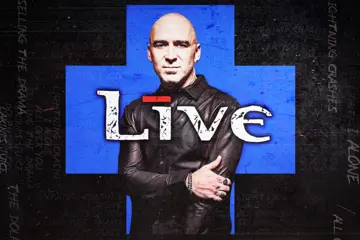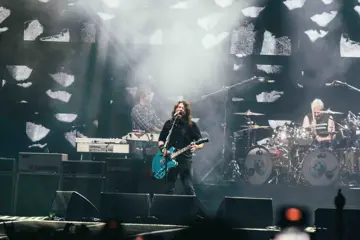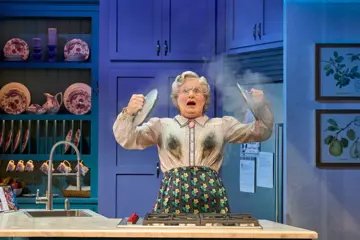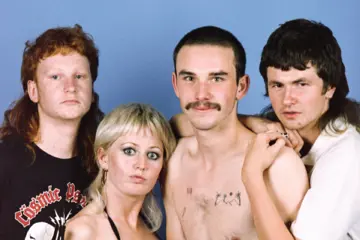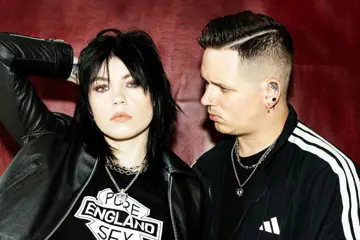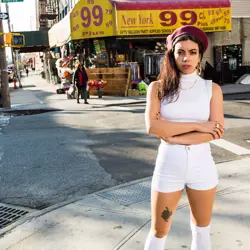 Hurray For The Riff Raff
Hurray For The Riff RaffThe term ‘itinerant’ doesn’t even begin to describe the amazing journey that Hurray For The Riff Raff mainstay Alynda Lee Segarra undertook after leaving her familial home in New York borough the Bronx a few years back. Setting off at the tender age of 17, she criss-crossed the country by any means possible – often hopping freight trains in the finest tradition of Woody Guthrie and Jack Kerouac – before settling on the music mecca of New Orleans as a place to set up home on a more permanent basis.
And didn’t The Big Easy welcome her with open arms. In a few short years she received an on-the-job musical education while playing on the streets, formed her folk-blues ensemble Hurray For The Riff Raff and before long was taking this newfound love of old-time Americana to the world at large. She even got to show off her beguiling music on acclaimed TV series Treme, which focused on the city’s rich musical heritage. Segarra remains completely appreciative of the opportunities afforded her thusly by New Orleans, the cultural melting pot which deservedly holds the mantle of America’s most unique and distinctive city.
“It takes a very long time to be considered a local, because a lot of people are coming in and out all the time,” she smiles. “It’s a place where a lot of people visit but not a lot of people live. But now that I’ve been on tour so much, it’s like I’m not considered a local – I’m hardly there! But people who are from there are so proud of their culture and their families have been there so long, so it definitely has that feel that you can live there for ten years and still not be a local. But at the same time I found that New Orleans people took me in, and were so supportive of me, and they’re very willing to share their culture and teach it to outsiders.
“When I first went there I didn’t know really how to play music at all – I could play a couple of Nirvana songs on guitar, left over from my angsty childhood. So I played the washboard just because I wanted to be involved – I just loved the idea of playing music on the street – and also because I was really broke, so it just seemed like the best thing to do. Then from there I went to banjo, and by that time I was already playing in a band that was travelling around, so I learned how to play banjo in North Carolina – and I learned how to play clawhammer style – and then when I went back to New Orleans was when I first started learning more about the chords in jazz songs, and playing along with jazz bands and stuff like that. That taught me a lot about singing too.”
Don't miss a beat with our FREE daily newsletter
The music of Hurray For The Riff Raff has a timeless feel, filtering the best traits of the music of yesteryear through a more modern context. Segarra explains that she’s long felt an affinity with the music of generations past.
“Yeah, I always was attracted to old music,” she tells. “In high school the first thing I ever heard that felt old like that was Johnny Cash – he’s sort of a good bridge for young punk kids. He was the bridge between punk rock attitude and classic country music, and of course from him I was able to go back further and find Woody Guthrie and find Alan Lomax recordings, and that was where I fell in love with it. I was always searching for that old sound, and just those old songs that felt like they were so real and so raw. People telling their stories – their life stories and their ancestors’ stories – I just really love that about American folk music.
“And if the story’s good you can just keep it going – that’s what I love. It’s like a game of telephone. What we try to do is take that story and make it modern, but keep all the good parts – keep the base of it – but change it to our time, and I think that’s the most exciting way to be a part of it. That’s what I think a lot of the greats have done – that’s what Woody Guthrie did and that’s what Dylan did – so we’re trying to just continue that tradition of taking those songs and adding onto them.”
Lyrically, Segarra has never shied away from either personal or societal politics in Hurray For The Riff Raff’s deeply-affecting music. Their most recent album Small Town Heroes – the band’s fifth studio full-length – perfectly encapsulates this willingness to explore topics which others deem too contentious. One track in particular, The Body Electric, is incredibly moving as it explores the socially taboo topic of a gang rape which actually occurred in Delhi in 2012; is important for Segarra to tackle such serious issues in her music?
“That was always my dream, to be honest,” she admits. “I felt really unhappy with the music I made before, because it felt like those songs were stepping-stones towards something – the greater goal. That’s why this album feels so satisfying, because I was able to really finally incorporate these ideas that mean so much to me, that I’ve learned from reading feminist theory books or just my experience in life. I really wanted to just meld that with the music, and I felt that it was so hard to do it without coming off as being preachy or being corny – with my generation it’s so hard to talk about a political issue and be taken seriously. So I felt like it finally clicked with that song, and I’m really excited to just see where it takes me.
“In the earlier music I was really just working off personal experience, just trying to share the hard parts of my life. Every time I was speaking to someone I was speaking to myself, and I felt like that really is how music has influenced me. I remember seeing an interview with John Lennon when he talked about how all of his songs were written for him, but if they reach somebody else then that’s great. I guess I felt like there’s a lot of feminist theory behind the idea that the personal is the political, and that’s where I was working from in the beginning; ‘Well, I’ll just be really raw and just lay it all out there, and if people hear this and it sticks with them then that’s great’. And now I feel like I’ve been able to refine that a little bit, just make it more musical.
I feel like it’s a process of making it about the song, instead of just this really intense emotion that people have to listen to. It can be a little bit more melodic.”
The country music scene in which Hurray For The Riff Raff move these days is notoriously conservative. Segarra herself identifies as queer and one of her bandmates (fiddle player Yosi Pearlstein) is openly transgender, traits which emerge regularly in the band’s narratives. Have they had any backlash from addressing feminist or queer issues in this oft-insular realm?
“You know, you’d think that we would, but really I think we just get ignored by those people,” Segarra laughs. “I think most of those people don’t even know we exist, or just write us off, like, ‘Whatever, who are those guys?’ We’ve never really got any negative reaction, I feel like we’re just attracting the people who have been waiting for something like this, or just people who are excited to see something new. Even if they don’t identify as queer or as a feminist they’re just excited that there’s something different going on, and they identify with being a weirdo. So we haven’t really had that much negative reaction to be honest, which is great.”
Hurray For The Riff Raff’s aural aesthetic has morphed significantly over the years – is it still evolving or does she feel like they’ve found the essence of the band’s sound?
“We’ve definitely found the essence of it – if anything Small Town Heroes is a really good mixture of what people liked about our earlier records, and then [2012 fourth album] Look Out Mama,” Segarra tells. “I think we’ve finally found a middle ground. But we’re always trying to evolve – we definitely feel like we’ve found our sound, and now it’s really exciting to just continually grow. I just want to write better and better songs, I guess. I always want to feel like there’s better stuff ahead, or else I’ll just get bored.”




